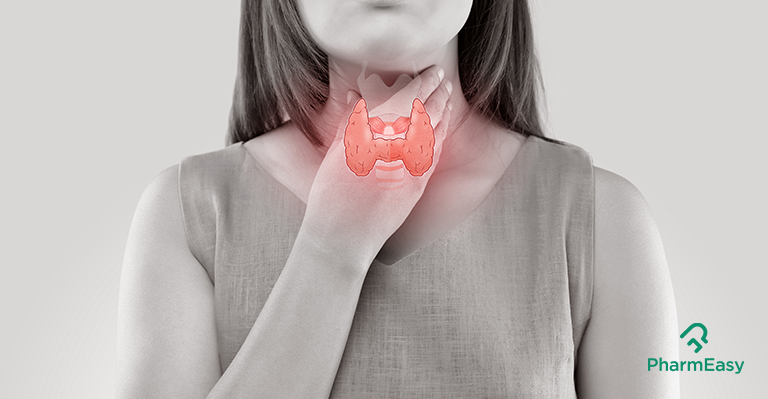Precautions For Thyroid Patients – Do’s & Dont’s
By Dr. Vishesh Bharucha +2 more

Get,

to manage your symptom
Get your,


4 Cr+ families
benefitted

OTP sent to 9988776655



You’ve successfully subscribed to receive
doctor-approved tips on
Whatsapp

Get ready to feel your best.

Hi There,
Download the PharmEasy App now!!


Register to Avail the Offer
Send OTPBy continuing, you agree with our Privacy Policy and Terms and Conditions

Hi There,
Sign up on PharmEasy now!!
Trusted by 4 crore+ families

OTP sent to 9988776655



You have unlocked 25% off on medicines




Code: NU25
By Dr. Vishesh Bharucha +2 more
Table of Contents
Did you know that 15 out of 1000 women and 1 in 1000 men experience thyroid problems?1 While it’s important to monitor your diet if you have a thyroid condition, paying attention to lifestyle factors is just as crucial.
The thyroid gland plays a key role in managing the metabolic function of the body. When the thyroid does not function properly, it can affect the entire body. Individuals with thyroid issues may experience symptoms such as depression, weight gain, fatigue, low body temperature, hair fall, sensitivity to light, and reduced stamina. It’s important to understand how to manage thyroid conditions properly, including the key dos and don’ts.

Thyroid disorders affect approximately 1-10% of the adult general population, with women being 8 to 9 times more likely to be affected than men2,3.
Before we dive into the dos and don’ts of thyroid care, it is important to recognise the signs of thyroid problems. There are two main types of thyroid conditions: hyperthyroidism, which occurs when the thyroid is overactive, and hypothyroidism, which occurs when the thyroid is underactive.
If you have hyperthyroid issues, you may experience any of the following symptoms:
If you have hypothyroid issues, you may experience any of the following symptoms:
If you notice one or more of these symptoms, you should speak with a doctor immediately and request a blood test. Apart from confirming a diagnosis, your doctor will guide you with a list of dietary dos and don’ts for thyroid issues (some of which we’ve listed below). Note that, while dietary precautions are important for thyroid patients, it’s even more crucial to take the prescribed medication in the correct dosage.
Thyroid hormones control the basal metabolic rate in the body, hence the weight loss or gain in thyroid diseases. Regular thyroid profile testing and adjustment of dose by an endocrinologist is of paramount importance.
Dr. M.G. Kartheeka, MBBS, MD(Pediatrics)
It is important to check thyroid levels regularly, measuring TSH, T3, T4, and sometimes free T3 and T4 levels. Whether you get it done from the convenience of your home or visit a laboratory, it is up to you. If you have symptoms of a thyroid disorder, it is important to have a frank discussion with your doctor regarding your symptoms and get a physical examination done to seek clarity on the exact cause of your symptoms7.
Individuals with thyroid issues may be recommended to drink distilled water as chlorine, fluoride and bromine levels are low in distilled water and it is iodine-free, which helps the thyroid to function properly. Distilled water may also be helpful in cleaning the liver and kidneys of toxins.
Individuals with thyroid issues must have foods with vitamin B such as crabs, shellfish, and brazil nuts as these foods contain selenium, a mineral that is needed for optimal thyroid function. Tyrosine is necessary for the production of thyroid hormones. Tyrosine-based foods, such as almonds, sesame seeds, and oats may help reduce inflammation and help enhance health. Antioxidant-rich foods like fresh vegetables and fruits may also help reduce inflammation and support overall thyroid health8,9.
Smoking and drinking alcohol should be avoided in individuals with thyroid disorders. Alcohol can suppress thyroid gland function, while tobacco or smoking may interfere with iodine uptake and disrupt normal thyroid hormone synthesis. Smoking is also associated with an increased risk of Graves’ disease (hyperthyroidism) and may worsen thyroid eye disease10,11.
Caffeine is a stimulant that can temporarily increase the heart rate and blood pressure. Sugar also has detrimental effects on the body. Caffeine has antioxidant properties, so consuming it in small amounts may have an anti-inflammatory effect. However, consuming more than the recommended amount of caffeine can alter the TSH levels produced by the pituitary gland.
Many individuals with thyroid conditions may find it difficult to understand the changes happening in their body and often turn to the internet for answers. However, online sources can vary in accuracy and may lead to confusion or unnecessary concern.
It’s helpful to be aware of the common symptoms and conditions linked to thyroid issues. However, it’s important to consult a qualified doctor for an accurate diagnosis and appropriate medical guidance before starting any treatment or management plan.
By understanding the signs of thyroid problems and following the right medical advice, you can take control of your health and manage symptoms effectively. A balanced approach involving regular check-ups, the right medications, and healthy lifestyle habits is key to supporting thyroid function.
Also Read: Effective Care and Natural Masks for Acne
Disclaimer: The information provided here is for educational/awareness purposes only and is not intended to be a substitute for medical treatment by a healthcare professional and should not be relied upon to diagnose or treat any medical condition. The reader should consult a registered medical practitioner to determine the appropriateness of the information and before consuming any medication. PharmEasy does not provide any guarantee or warranty (express or implied) regarding the accuracy, adequacy, completeness, legality, reliability or usefulness of the information; and disclaims any liability arising thereof.
You may also like
Comments